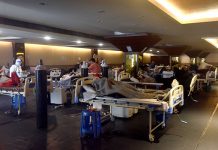In the case of COVID-19 the cure provided in many countries in the form of draconian measures has led to a very serious side-effect—rapid decline of human rights and aggravation of authoritarian trends.
The UN High Commissioner for Human Rights Michelle Bachelet said on April 27 , “ In some cases, people are dying because of the inappropriate application of measures that have been supposedly put in place to save them.”
She explained, “ There have been numerous reports from different regions that police and other security forces have been using excessive, and at times lethal, force to make people abide by lockdowns and curfews…Such violations have often been committed against people belonging to the poorest and most vulnerable segments of the population.”
In the wake of the spread of COVID-19 many governments rushed to assume emergency powers and then misused them for narrow, selfish ends to increase authoritarianism. In other cases the new situation was used as an experiment to examine how people can be made to obey extreme orders without raising any questions, a portent of dystopian future trends.
In such a situation the UN High Commissioner warned, “Emergency power should not be a weapon governments wield to quash dissent, control the population , and even perpetuate their time in power. They should be used to cope effectively with the pandemic, nothing more, nothing less.”
A special situation was created by COVID-19 in which it became necessary to release prisoners from overcrowded prisons to prevent large-scale infections. Significant numbers of prisoners were released from prisons of several countries like Turkey, Iran and India. In fact in India there were court orders from the higher judiciary for this.
In such a situation the UN High Commissioner as well as several human rights organizations had stated that when prisoners are selected for release then apart from prioritizing some seriously ill prisoners, political prisoners should get very high priority in this selection for release as ethical reasons for their release are the strongest. The case is very strong for release of ailing or disabled political prisoners, and there are a number of political prisoners in various prisons of world who have have serious ailments and disabilities.
However these pleas on behalf of political prisoners did not receive the due attention from the authorities and instead in some countries many eminent persons with dissenting views continued to be arrested despite expression of strong support for them by a significant number of citizens. Hence the efforts for release of political prisoners during this phase should be strengthened.
While there is a very strong reason for decongesting prisons, instead arbitrary rules to act against people on flimsy grounds during lockout situations are being used to arrest or implicate people in cases where arrests can be easily avoided. Legal cases have been foisted when people left hungry and isolated by lockdowns have offered mild protest against injustice done to them. In all such cases should be withdrawn as soon as possible and the higher judiciary in various countries should give strict directions to ensure that people already badly affected by extraordinary sudden adverse situations are not further harassed and traumatized by arbitrary arrests or victimization.
The writer is Honorary Convener of Save the Earth Now Campaign. His recent books are Protecting Earth for Children and Planet in Peril.














